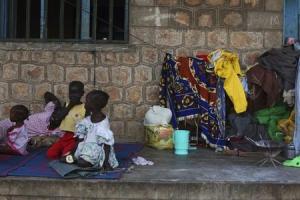Aid groups raise fears of escalating violence in South Sudan
NAIROBI (Thomson Reuters Foundation) - Rape and killing driven by
revenge is spiraling to new highs in South Sudan after 18 months of
fighting and the world looks the other way, according to aid groups
working in world's youngest country.
Fighting has forced thousands to flee their homes in
recent days and some 650,000 civilians are without access to aid,
according to the United Nations (U.N.) Humanitarian Coordinator for
South Sudan.
Children as young as seven have been raped and whole villages burned to
the ground in the latest violence, the U.N.'s children's fund said. Four
civilians were killed when mortar bombs hit a U.N. compound near an
oilfield on Tuesday.
But while images of the conflict in Syria are regularly in the news
due to widespread use of social media, aid workers said it was barely
possible to get a mobile phone signal in most of South Sudan so the
ongoing violence received little attention.
"You have a level of violence which is unheard of," Yves
Daccord, director general of the International Committee of the Red
Cross (ICRC) told the Thomson Reuters Foundation.
"There is no respect ... It's about revenge, nothing else."
The world's newest state, which declared independence from
Sudan in 2011, was plunged into conflict nearly 18 months ago between
forces loyal to President Salva Kiir and rebels allied with his former
deputy, Riek Machar.
The conflict in the northeastern African nation reopened ethnic
faultlines between Kiir's Dinka people and Machar's forces, who are
largely ethnic Nuer.
The medical charity Medecins Sans Frontieres (MSF) said over
11,000 newly displaced people have arrived at a United Nations (U.N.)
base in Bentiu, Unity State, in the country's north, in last few weeks
with "horrific accounts of violence."
"What concerns me the most is nobody is interested in South Sudan," Daccord said. "People are a bit tired."
South Sudan is ICRC's second biggest operation in the
world after Syria, with a budget of $140 million. It could be its
largest by mid June, when it will appeal for additional funds.
Fighting has forced ICRC to evacuate some staff from Leer
in Unity State and MSF staff in Leer have fled into the bush, taking
nine patients with them, including three babies.
Attacks on health facilities appear to be driven by
revenge and a lack of control over young fighters, Daccord said.
"Some of them - but it's rare - will tell you: "Yes, we
understand that (it is illegal to attack health facilities), but it's
difficult because the others did the same, so it's difficult to stop my
people'," he said.
"Everything is done to create a cycle of violence and that is what worries me so much."
(Reporting by Katy Migiro, Editing by Belinda Goldsmith)


No comments:
Post a Comment